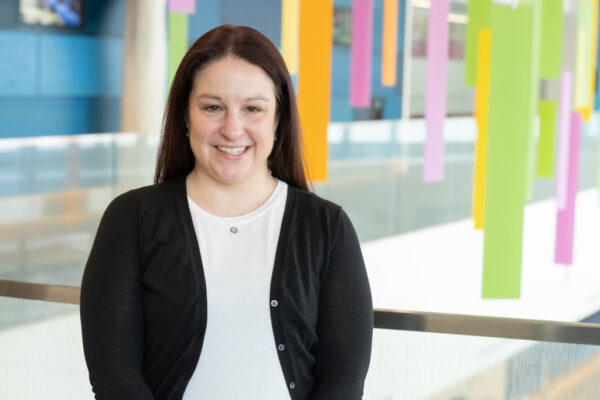
Angela Shorb, cardiac staff nurse, pediatric intensive care unit
For a new nurse, preceptorship is an important factor in the transition of student to bedside nurse. Because of this, all newly hired or transferred nursing staff at Akron Children’s are assigned to work with a preceptor to help orient them to their new role.
Angela Shorb, a night shift nurse who has been a preceptor in the Pediatric Intensive Care Unit (PICU) for 16 years, says, “My role is to help educate, assess learning needs, provide feedback (both positive and negative), socialize and encourage critical thinking skills in those new to the unit.”
Guidelines to becoming a preceptor include having a BSN, being a nurse for a minimum of two years and having no disciplinary action. Nurses can either apply to become a preceptor or be referred by their unit clinical coordinator, educator or manager and must attend a 4-hour preceptor workshop.
The amount of time newly hired nurses must precept varies based on what department they work in and how much experience they have.
“Educators work very closely with new hires, preceptors and those in leadership roles to determine the course of the new nurse’s orientation,” said Samantha Litherland, clinical coordinator in the infant unit and a primary preceptor on 7200 from 2017–2021. “The time commitment for precepting also varies based on the preference of the primary preceptor.”
Angela says a typical orientation to the PICU can last an average of 16 to 18 weeks.
“Working night shift, a preceptee will begin with me about halfway through that orientation process,” she said. “I will have a preceptee for about six to eight weeks on average.”
“If you complete the CARE Ladder nursing development program, there is a Preceptor Recognition of Excellence Program,” she said. “It consists of three tiers and offers different rewards and benefits for preceptors who meet the required criteria.”
When a nurse becomes someone’s primary preceptor, the preceptee will be scheduled on the same days/shifts and will not be with another nurse unless their primary preceptor is absent.
“Typically, nurses spend the majority of their time orienting on the particular unit where they are hired,” said Samantha. “If they are a float nurse, they will spread their orientation time out on the various units, but spend more time in specialized units such as the ED or ICU.”

Samantha Litherland, clinical coordinator, infant unit
Angela says a typical day precepting includes receiving a bedside report, doing a safety check of equipment, checking medication and lab orders and reviewing the patient’s diagnosis.
“I will have my preceptee give a brief rundown of what they will do or accomplish,” she said. “I will ask questions that encourage critical thinking. If time allows, we review worst case scenario questions. Before report in the morning, I try to answer any questions and talk about how they thought the evening went.”
Samantha says her preceptees spend their first day in an observation role.
“I show them where different things are located. I have them watch me assess and interact with patients and include them on any procedure or educational opportunity that would be beneficial to experience,” she said. “As the shifts progress, they start to become more independent and confident, and utilize the preceptor as more of a resource when necessary.”
The preceptor program benefits the hospital because the preceptees are placed with a small, consistent group of nurses who are trained to help them transition to a more independent role and have prepared them for situations where they must use critical thinking.
“They form meaningful relationships with those who they precepted with from various units, are familiar with staff when they float to other units and are more likely to stay employed at the hospital due to the support they have received,” said Samantha.
“Having a preceptorship program helps new nurses adapt to the ever-changing world of health care and contributes to nurse retention,” said Angela. “I enjoy sharing the knowledge I’ve acquired and passing that along. Being a preceptor has allowed me to develop leadership skills and stay up to date with the most recent evidence-based research.”
Samantha says one of the things she enjoyed most about precepting was being able to calm the nerves of an anxious new nurse and be someone they could go to without any added stress. Although she no longer serves as a preceptor, she says some of the skills she gleaned as one help make her a better leader.
“I’ve been told a number of times that I am very approachable as well as calm, even when everything seems completely chaotic on our unit,” she said. “Many staff nurses have also said that they were able to remain calm because they saw me remain calm. If I can help someone be a little less stressed, help them find their confidence, and feel like they’re doing the best for their patient, my job is done. I have the preceptor program to thank for that.”










